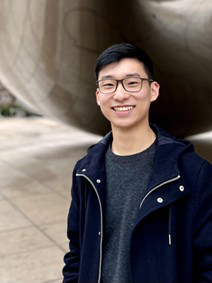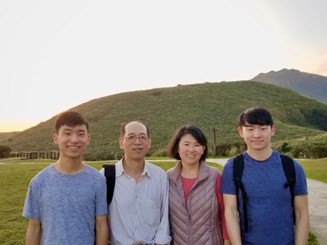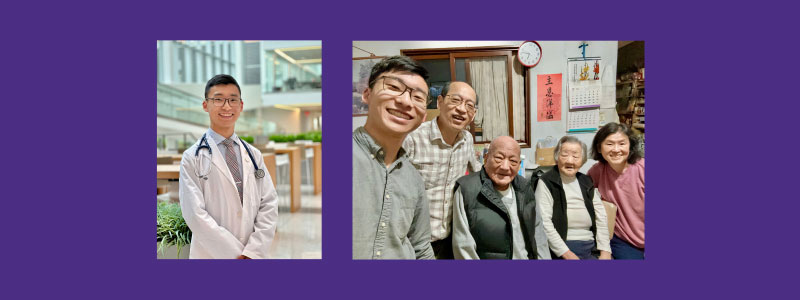Raised by immigrant parents from Taiwan, Philip Lee grew up in a home shaped by dedication and respect for hard work. His father, although not in medicine himself, regarded the profession as one of dignity and service, hoping both his sons might become doctors. However, while his older brother pursued medicine, Philip was determined to forge his own path, initially turning away from the medical field

When a friend shared with me the field of bioengineering, I conceptualized it as the ‘back-end’ side of medicine, and I was intrigued. – Philip Lee
During his early college years, Philip explored his passion for filmmaking, photography and music, creating his own films and composing original scores. Although he seriously considered a future in the arts, his strengths in science pulled him toward a more structured path, leading him to discover bioengineering.
“When a friend shared with me the field of bioengineering, I conceptualized it as the “back-end” side of medicine, and I was intrigued,” says Philip. “Eager to see how bioengineering would push me to excel in the sciences, which I did not want to give up entirely for the arts, I also found bioengineering a nice compromise—far enough from medicine for me to be satisfied and close enough for my dad to be satisfied.”
UW Bioengineering’s undergraduate program became a formative environment for Philip, particularly under the mentorship of Professor Paul Yager. Engaging in research on low-cost diagnostic devices, he delved into a field focused on advancing global health. The hands-on experience cultivated his analytical skills, his perseverance and a newfound confidence in presenting research to seasoned academics. This mentorship instilled in him a deep respect for the scientific process and the role of bioengineering in healthcare innovation.
Reflecting on his relationship with Professor Yager, Philip states, “Now suffice to say—if I could consolidate all my experiences in his lab in a few sentences—here in his lab I found unparalleled growth. I would certainly not be where I am today were it not for Professor Yager and his most talented, innovative, and brilliant group of postdocs, graduate students and staff scientists.”
In addition to his research, Philip actively contributed to campus life. As a member of the Husky Experience Student Advisory Council, he helped establish the Husky Seed Fund to finance student-led projects—a program that remains impactful today. He also co-founded a health-focused business, “Alimental,” and pursued a minor in entrepreneurship. These ventures enriched his understanding of leadership, business and the importance of interdisciplinary skills in making a positive impact.
After graduating from UW, Philip entered the Berkeley – UCSF Graduate Program in Bioengineering to pursue a Ph.D. in bioengineering in the lab of Professor Dan Vigneron, where he focused on developing novel metabolic imaging tools to assess response to cancer therapies in patients. It was during this time that a pivotal experience reshaped his perspective on patient care. Reviewing clinical records, he encountered the story of a young mother facing terminal cancer, a moment that moved him deeply. He states, “Working behind my computer, I could not divorce the person—or her struggle—from the data. I wanted to be at the bedside, to be the oncologist to support her as a trusted guide. But a horrible feeling soon set in—a vast chasm in space and time separated me from this patient, and I felt utterly unable to act upon my intentions to help. Her story was only something I could helplessly view from afar.”
My tools as a researcher could have given her nothing more than an impersonal number of how her disease was progressing, but it would be as a physician that I could connect with her as a human. – Philip Lee
Realizing he wanted to not only develop tools for treatment but also offer direct care, he began to reconsider a career in medicine. Philip states, “My tools as a researcher could have given her nothing more than an impersonal number of how her disease was progressing, but it would be as a physician that I could connect with her as a human.”
However, the road to medical school was not without challenges, and Philip’s initial round of applications were rejected. After graduating from Berkeley, Philip enrolled in a Christian faith-based program in Anaheim, California, where he grew personally and spiritually. This period of reflection reinforced his commitment to becoming a physician, and the support and growth he experienced gave him the strength to apply to medical school again.
Meanwhile, his research continued to gain recognition, culminating in a nomination as Finalist for the International Society for Magnetic Resonance in Medicine (ISMRM) Young Investigator Award, which strengthened his resolve to evolve from a researcher into a physician-scientist, bridging his contributions to the field with direct patient care. Philip says, “With research I had the potential to help the thousands, but now with medicine I wanted to heal the one. Simply put, it was the commonly shared experience of human life and existence, fraught with all its joys and despairs, that drew me to consider medicine once more.”
Now pursuing his medical degree at the University of Pennsylvania School of Medicine, Philip reflects on the importance of his mentors and the resilience that sustained him through setbacks. Guided by the support of mentors like Professor Yager, he has embraced the circuitous route his career has taken, recognizing that his unique path has enriched his purpose. He is driven by a desire to make a difference not only through innovation but also through compassionate, human-centered care.
With research I had the potential to help the thousands, but now with medicine I wanted to heal the one. – Philip Lee
Philip is now poised to combine his background in bioengineering with a medical career focused on serving others. His journey—from bioengineering to medicine, through research and personal growth—speaks to his commitment to healing and innovation. As a physician and researcher, he aspires to connect deeply with patients, guided by a vision of empathy, perseverance and purpose. “Medicine has taken a circuitous route, one in which I did not know the destination—and I still don’t really,” says Philip. “But it has been a journey of faith from within and from without, especially from my mentors who invested so much in bringing me to the present day.”




